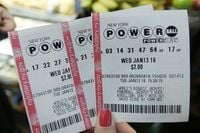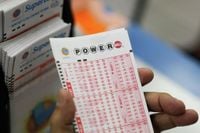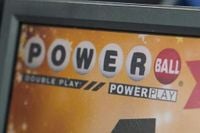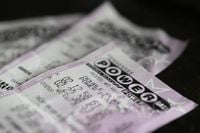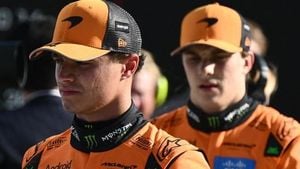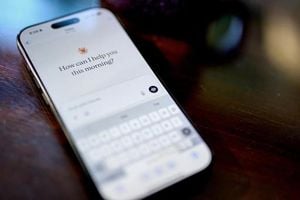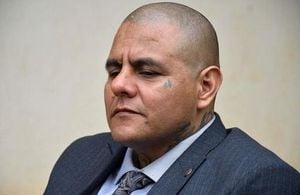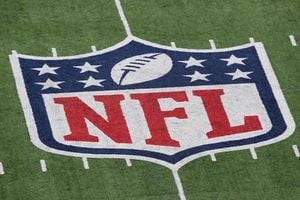Saturday, September 6, 2025, will go down as a day of life-changing fortune for two lucky Powerball players—one in Missouri and one in Texas—who managed to defy the odds and claim a share of the second-largest lottery jackpot in U.S. history. After a suspenseful run of more than three months without a major winner, the $1.8 billion Powerball jackpot was finally split, ending a streak of over 40 consecutive drawings with no jackpot claimed, according to reports from the Associated Press and Nexstar.
The Texas ticket, as confirmed by both the Texas Lottery and local outlets like KXAN, was sold at Big's 103, a convenience store located at 11905 E US Hwy 290 in Fredericksburg, about 68 to 70 miles north of San Antonio. The Missouri winner, whose details remain shrouded in mystery, purchased their ticket in a state that has a long tradition of lottery luck—this marks Missouri’s twelfth Powerball jackpot-winning ticket, while Texas notches its third.
The winning numbers that sealed their fates were 11, 23, 44, 61, and 62, with the Powerball number 17. The jackpot, initially estimated at $1.8 billion, was officially tallied at $1.787 billion by Sunday morning, with a cash value of approximately $820.6 million. Each winner now faces a significant decision: whether to accept their windfall as a lump sum—worth about $410 million each before taxes—or opt for 30 annual payments over 29 years, a structure known as an annuity. History shows most winners opt for the cash.
While the jackpot’s astronomical odds—1 in 292.2 million—are designed to build up such massive prizes, they also ensure that big wins are rare. This drawing ended a Powerball drought that stretched back to May 31, 2025, according to Powerball officials. During that time, the jackpot ballooned with every drawing, captivating the nation and driving countless players to try their luck at authorized retailers and, in some states, online platforms.
But it wasn’t just the two jackpot winners who struck it rich. The drawing produced a cascade of smaller fortunes across the country. Two tickets—one in Kansas and another in Texas—matched all five white balls plus the Power Play, earning their holders a $2 million prize. Eighteen more players matched all five white balls (but not the Powerball), winning $1 million each. These million-dollar tickets were scattered across California (2), Colorado, Florida, Illinois (2), Kansas, Maine, Michigan, New Jersey, New York (2), Ohio (2), Oregon, Texas (2), and West Virginia, as detailed by Powerball and local news outlets.
With the jackpot now claimed, the Powerball prize pool resets to a still-impressive $20 million for the next drawing, scheduled for Monday, September 8, 2025, at 10:59 p.m. ET, with a cash value of $9.2 million. Meanwhile, the Mega Millions jackpot continues to climb, with the next drawing offering an estimated $358 million, or $164.5 million in cash, as reported by Nexstar.
For those dreaming of future riches, Powerball tickets remain $2 apiece and are available in 45 states, plus Washington, D.C., Puerto Rico, and the U.S. Virgin Islands. Drawings are held three times a week—Monday, Wednesday, and Saturday—and can be watched live via the official Powerball website, local broadcasts, or even YouTube, as outlined by Houston Chronicle coverage.
What’s perhaps most remarkable about this particular Powerball win is the veil of secrecy that may linger over the winners’ identities. Both Missouri and Texas have laws that allow lottery winners to remain anonymous under certain conditions. In Missouri, the winner’s name is only released with written consent, while in Texas, those who win more than $1 million can choose to keep their names private, though their city or county of residence may still be disclosed. As Nexstar notes, this means the public may never know who is now hundreds of millions of dollars richer.
This growing trend toward anonymity marks a shift from the lottery’s early days in America. According to Jonathan D. Cohen, author of For a Dollar and a Dream: State Lotteries in Modern America, public disclosure was once considered essential for building trust in the system. “Here’s this housewife, here’s this orphan,” Cohen reflected on the spectacle of past in-person drawings, where winners would be celebrated on stage, sometimes to tears. But as multi-state lotteries like Powerball and Mega Millions emerged, the human element faded in favor of ever-larger jackpots and, some would argue, greater personal security for winners.
Security and privacy have become paramount for many recent winners. Attorney Mark K. Harder, who claimed an $842.4 million jackpot for a Michigan couple in 2024, told the Associated Press that his clients wanted to be “perceived the way they had always been perceived.” The couple even hired a public relations team to scrub their social media profiles before claiming their prize, a testament to the modern-day risks of sudden wealth.
Despite the occasional cautionary tale—like that of Andrew "Jack" Whittaker Jr., a West Virginia winner who became a public figure and later suffered scandals and personal setbacks—most winners, according to Cohen, remain healthier and wealthier than the average American. Still, states have a vested interest in some level of disclosure to prevent fraud and maintain public faith in the lottery system. Mechanisms exist to ensure that, even if the public doesn’t know a winner’s name, lottery commissions do.
For those who missed out on the big prize, smaller wins remain within reach. Powerball offers eight ways to win beyond the jackpot, with prizes starting at $4. The odds of winning any prize are significantly better—about 1 in 24.87—than the daunting odds of hitting the jackpot. And with the next drawing just around the corner, the excitement is far from over.
As the dust settles in Fredericksburg, Texas, and somewhere in Missouri, two new multimillionaires are left to navigate a future forever changed by a stroke of luck. Whether they choose to step into the spotlight or maintain their privacy, their stories—like those before them—will fuel the dreams of millions who line up for their own chance at fortune, week after week.
